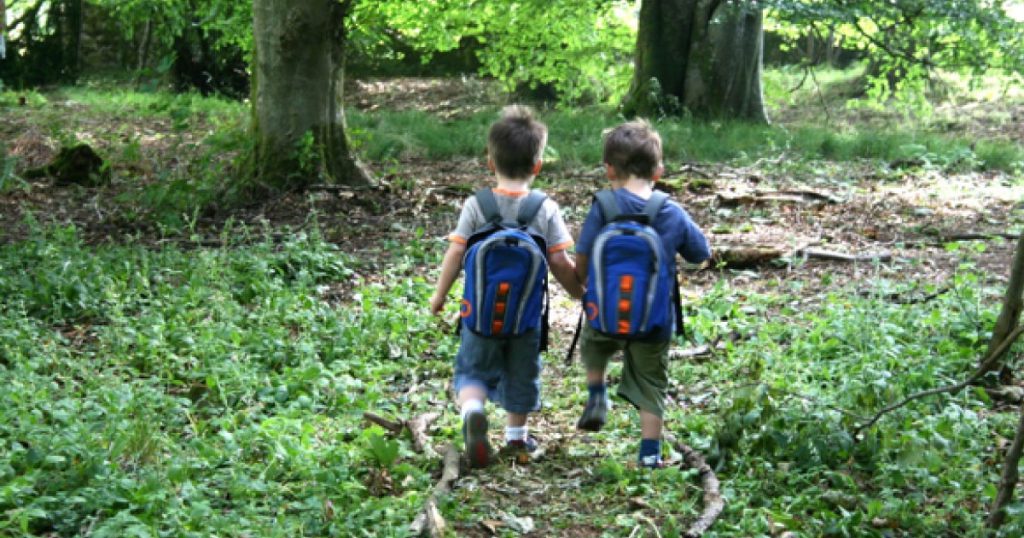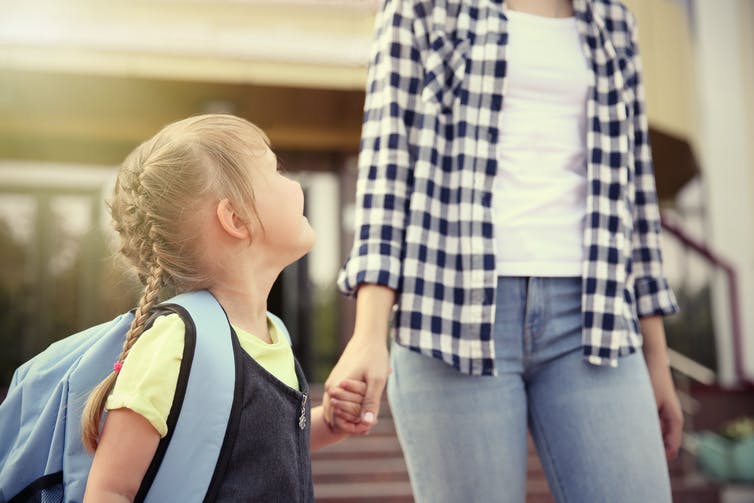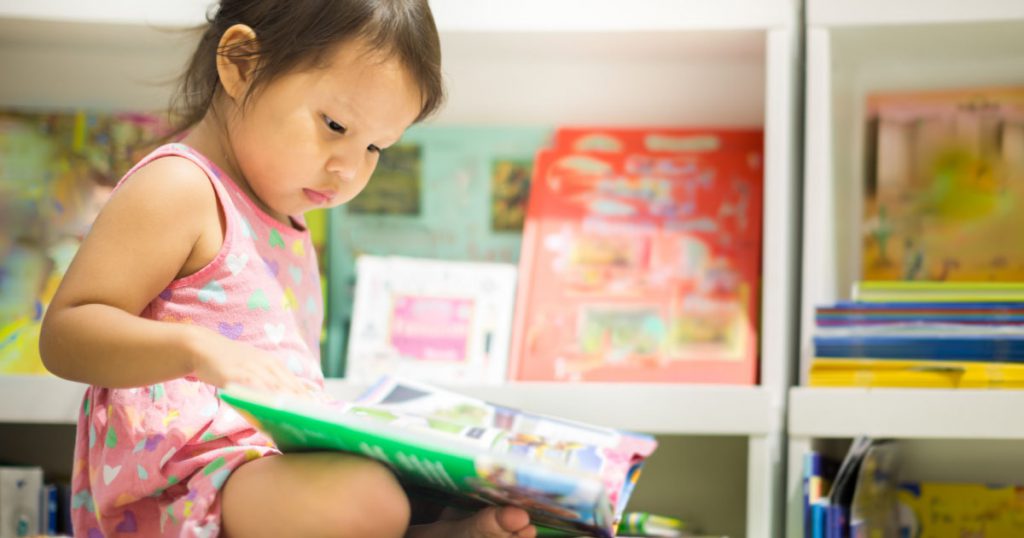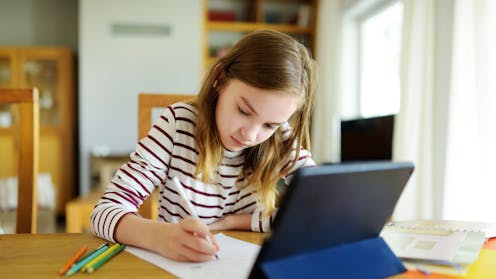
Every year, thousands of New South Wales students sit a test to determine places for highly sought-after selective high schools. These are academically selective public schools often associated with high Year 12 scores.
While there has long been a level of expectation around selective school entrance, the most recent round of testing has shone a fresh light on the pressures some young people are experiencing.
Media reports have described some students studying for 18 months to prepare for the selective school test, with multiple sessions of tutoring each week.
Earlier this month, police were called to control crowds at two testing centres as parents and students from one session overlapped with another. This is also the first year the tests have been done online and there were technical difficulties as students tried to complete exams.
One exam invigilator told The Sydney Morning Herald about the stress they witnessed among students.
We were dealing with kids who were freaking out and totally traumatised by what was going on. You could not make up a worse nightmare than what we went through that day.
It’s not surprising children were upset. The pressure to perform well on test day is enormous. As my previous research has found, some families believe entry into a selective school will secure their child’s future.
As my new research with colleagues suggests, this sees some families place huge pressure on students to study and prepare for academic tests in primary school.
Not just a NSW thing
Most (albeit not all) of Australia’s selective schools are in NSW.
But there is pressure around other tests in the primary years. There are similar levels of competition for lucrative private school scholarships around Australia, which children sit as early as Year 3. Many of these are determined by centralised tests.
Tutoring companies also offer programs for primary students preparing for NAPLAN tests in Year 3 and Year 5, as well as the “opportunity class” test in NSW (for an academically selective stream for Year 5 and 6).
Our research
In ongoing, as yet unpublished research on education cultures among migrant communities in Sydney, colleagues and I are focusing on 38 families with children in upper primary school.
In 2022 and 2023, we interviewed students, parents and teachers at six schools in high and low income areas of Sydney. All schools included large numbers of Asian migrants, allowing us to compare different groups’ approaches to education.
While not necessarily representative of all Asian migrant families, or all families with school-aged children in general, we found intensive preparation for the selective test was common in this group, especially among those students already enrolled in an opportunity class.
The tutoring routine
Many students preparing for the selective test told us they attended private tutoring three or more days per week, in addition to completing home based study. Some had begun this routine up to 12 months before to the test.
One mother, whose son attended tutoring every day, at three different centres, on top of two hours of daily homework, told us,
That’s how we prepare for selective […] You need to be methodical […] no pain, no gain.
Other parents explained they resorted to private tutoring because schools did not teach what was needed to succeed in the selective tests.
Not only do children spend afternoons, evenings and weekends in tutoring centres, they are also often giving up most if not all recreational, sporting and other extracurricular activities, narrowing their focus to acing the test.
Families also postpone holidays, outings and other potential distractions. Many of our student participants aiming for a selective school told us they never socialised with their friends outside of school time.
Sometimes they even neglected their school work so as to focus on the selective test. One teacher told us many of her students were absent from school in the week prior to the test, to ramp up their preparation.
How does this impact students?
This culture of extreme study and competitive schooling raises profound questions about the implications for student wellbeing. Some students spoke about their fatigue. As one student said:
I work up to late at night. So sometimes I feel drowsy and I yawn a bit and have water in my eyes.
Their teachers also expressed concern about insufficient sleep and heightened stress caused by the pressure to get into a selective school. They described students’ tears if they were not successful when the results came out.
One teacher said he had a “blanket rule” of not talking about the tests in the classroom, because his students were so preoccupied with ensuring they were doing enough preparation.
Other teachers reflected on students’ fear of taking risks because of the culture of perfectionism associated with scoring and ranking through tests.
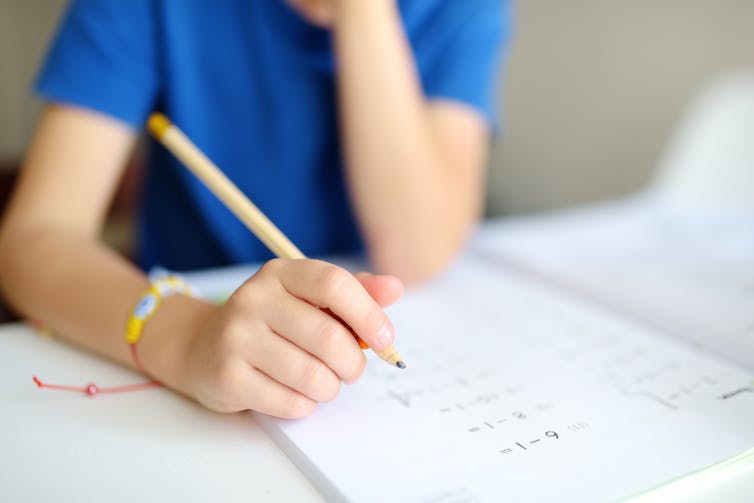
Maria Sbytova/ Shutterstock
What does the research say?
International research shows an association between high-stakes testing in primary years and issues with children’s mental health and academic confidence. There is also a negative association with students’ achievement in maths and literacy. That is, students who experience pressured exams were more likely to experience anxiety and depression, and not do as well in core subjects as those who did not experience this pressure.
Some parents in our study expressed concern for their child’s wellbeing. But others saw stress a positive sign of engagement and commitment, and necessary for securing the all important place in a selective school.
Given many are recent migrants, without established networks in Australia, and fearful of racial discrimination against their children, they believe education to be the most crucial foundation for future success.
However, we need more research on the impacts of these parental aspirations and anxieties on the next generation. And a broader discussion about the benefits of selecting some students – who may have benefited from extensive and expensive private tutoring – to go to separate, high-performing government schools.
Megan Watkins, Greg Noble and Alexandra Wong all contributed to the research on migrant families mentioned in this article, as part of a larger Australian Research Council-funded project.
![]()
Christina Ho received funding from the Australian Research Council to conduct this research.
Read More: Read More

